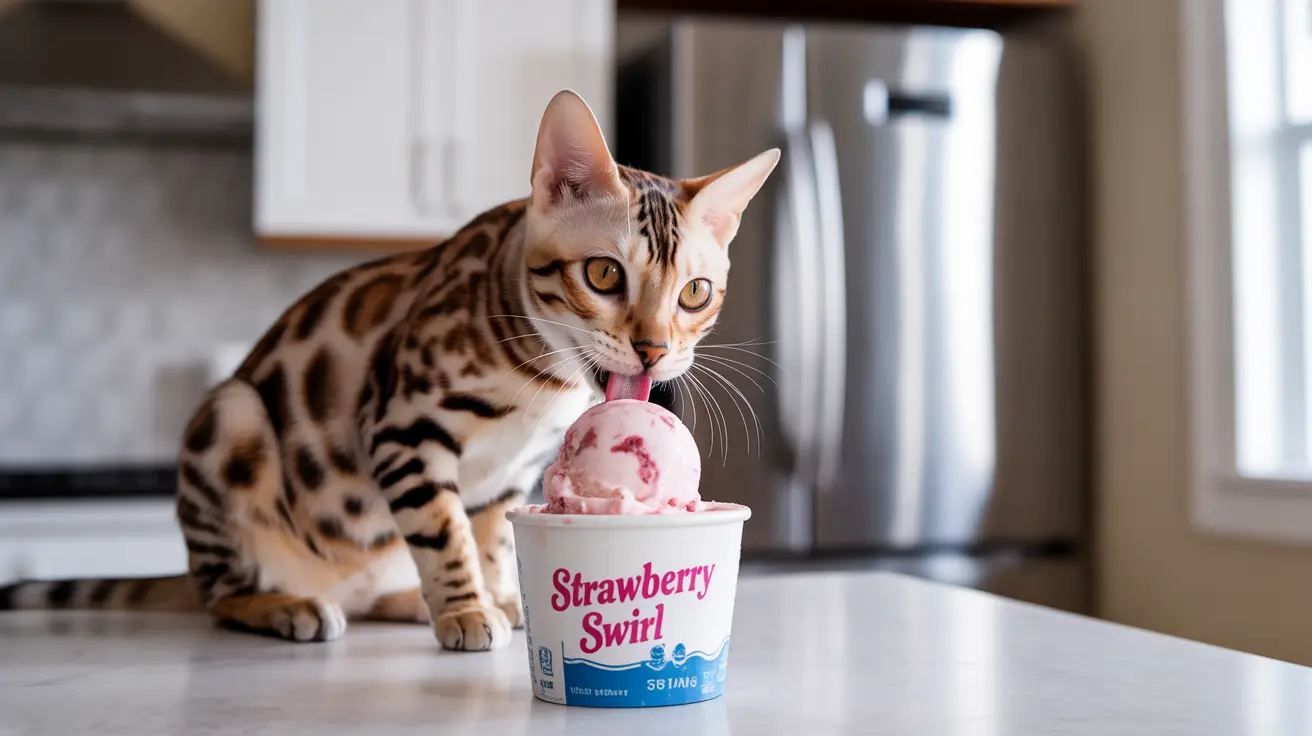Why Cats and Ice Cream Don't Mix
The primary reason cats shouldn't eat ice cream stems from their biological makeup. Most adult cats are lactose intolerant, lacking the necessary enzyme to properly digest dairy products. This intolerance develops after weaning, when cats no longer need to digest their mother's milk.
Beyond lactose intolerance, ice cream contains several components that can harm your cat:
- High sugar content that cats can't properly metabolize
- Excessive fats that may trigger pancreatitis
- Artificial sweeteners, particularly xylitol, which can be lethal
- Potential allergens and harmful additives
Dangerous Ingredients in Commercial Ice Cream
Many popular ice cream flavors contain ingredients that are toxic to cats:
Chocolate
Even small amounts of chocolate ice cream can be poisonous to cats due to theobromine and caffeine content. Dark chocolate varieties are especially dangerous.
Artificial Sweeteners
Sugar-free ice creams often contain xylitol, which can cause rapid blood sugar drops and liver failure in cats. Even small amounts can be fatal.
Other Harmful Components
- Coffee or espresso flavors
- Macadamia nuts
- Rum raisin (alcohol content)
- Propylene glycol (common stabilizer)
- High fat content that can lead to pancreatitis
Health Consequences of Feeding Ice Cream to Cats
When cats consume ice cream, they may experience various adverse reactions:
Immediate Effects
- Vomiting and diarrhea
- Stomach upset and bloating
- Brain freeze (yes, cats can get it too!)
- Lethargy
Long-term Risks
- Weight gain and obesity
- Diabetes
- Dental problems
- Chronic digestive issues
- Nutritional imbalances
Safe Alternatives to Ice Cream for Cats
If you want to treat your cat to something special and cold, consider these veterinarian-approved alternatives:
Commercial Cat-Safe Options
- Cat-specific frozen treats designed for feline consumption
- Specially formulated "cat ice cream" without harmful ingredients
- Frozen pet food toppers made with natural ingredients
Homemade Frozen Treats
- Plain, frozen chicken broth (no salt or seasonings)
- Frozen pure pumpkin puree in small amounts
- Ice cubes made from low-sodium tuna water
What to Do If Your Cat Eats Ice Cream
If your cat accidentally consumes ice cream, take these steps:
- Identify the flavor and ingredients
- Monitor for adverse reactions
- Contact your veterinarian if:
- The ice cream contained toxic ingredients
- Your cat shows signs of distress
- Symptoms persist for more than 24 hours
Frequently Asked Questions
Can cats eat ice cream safely, and what are the risks involved?
No, cats cannot safely eat ice cream. The main risks include lactose intolerance, potential toxicity from ingredients like chocolate or xylitol, and digestive issues from high sugar and fat content.
Why are most cats lactose intolerant, and how does ice cream affect their digestion?
Adult cats lose the ability to produce lactase, the enzyme that breaks down lactose, after weaning. When they consume ice cream, the undigested lactose can cause diarrhea, vomiting, and stomach upset.
What toxic ingredients in ice cream should cat owners watch out for?
Cat owners should be particularly careful of chocolate, xylitol (artificial sweetener), coffee flavors, macadamia nuts, alcohol-containing flavors, and propylene glycol in ice cream.
What symptoms indicate that my cat has had a bad reaction to ice cream or dairy?
Watch for vomiting, diarrhea, lethargy, excessive thirst, bloating, and stomach pain. In severe cases involving toxic ingredients, symptoms may include seizures or collapse.
Are there safe frozen treat alternatives for cats instead of regular ice cream?
Yes, safe alternatives include commercial cat-specific frozen treats, frozen plain meat broths, and small amounts of frozen plain pumpkin puree. Always choose products specifically designed for feline consumption.
Conclusion
While it might be tempting to share ice cream with your cat, the risks far outweigh any momentary pleasure. Instead, focus on providing your feline friend with nutritionally appropriate treats designed specifically for cats. Your veterinarian can recommend safe alternatives that will keep your cat both happy and healthy.






